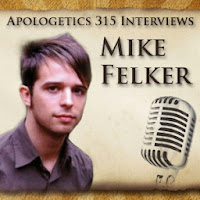 Here are this week's recommended apologetics links. Enjoy.
Here are this week's recommended apologetics links. Enjoy.
KINDLE DEALS:
• A Year with C. S. Lewis - 3.79
• Biblical Inerrancy: The Historical Evidence - 2.99
• Signature In The Cell by Stephen Meyer - 3.99
• Who is Jesus... Really? - FREE
• Christian Worldview: A Student's Guide - 3.99
• Covenantal Apologetics by K. Scott Oliphint - 4.99
• That's a Great Question: What to Say When Your Faith Is Questioned - FREE
• I Just Need Time to Think!: Reflective Study as Christian Practice - 3.03
WEEKLY LINKS:
• Is God Racist?
• Embarrassment of Riches
• Is “Rock and Roll” the Devil’s Music?
• Ap315 Interview with John Frame in Portuguese
• On Guard by William Lane Craig – A Book Review
• 10 Commandments of Christian Scholarship, Part 2
• Make the Pro-life Case Persuasively and Winsomely
• Women Apologists: Blazing Trails and Building Bridges
• Interview with Dr. Paul L. Maier : Jesus Never Existed?
• Lawrence Krauss vs. John Lennox on science and faith
• William Lane Craig on God, Immortality, and the Meaning of Life
• Eight Diagnostic Questions I Ask of those Who Are Doubting their Faith
Apologetics 315 is a registered 501(c)(3) non-profit. Would you support us monthly?
• A Year with C. S. Lewis - 3.79
• Biblical Inerrancy: The Historical Evidence - 2.99
• Signature In The Cell by Stephen Meyer - 3.99
• Who is Jesus... Really? - FREE
• Christian Worldview: A Student's Guide - 3.99
• Covenantal Apologetics by K. Scott Oliphint - 4.99
• That's a Great Question: What to Say When Your Faith Is Questioned - FREE
• I Just Need Time to Think!: Reflective Study as Christian Practice - 3.03
WEEKLY LINKS:
• Is God Racist?
• Embarrassment of Riches
• Is “Rock and Roll” the Devil’s Music?
• Ap315 Interview with John Frame in Portuguese
• On Guard by William Lane Craig – A Book Review
• 10 Commandments of Christian Scholarship, Part 2
• Make the Pro-life Case Persuasively and Winsomely
• Women Apologists: Blazing Trails and Building Bridges
• Interview with Dr. Paul L. Maier : Jesus Never Existed?
• Lawrence Krauss vs. John Lennox on science and faith
• William Lane Craig on God, Immortality, and the Meaning of Life
• Eight Diagnostic Questions I Ask of those Who Are Doubting their Faith
Apologetics 315 is a registered 501(c)(3) non-profit. Would you support us monthly?
• Shopping via Amazon? If you use this link, a bit of your purchase goes to fund Apologetics 315. Thanks for those of you using the link, as it helps Ap315.
Canada here. UK here.
• Would you like to help with interview transcription? If so, contact Ap315 here.
Get these sorts of links and more by following on Twitter.Canada here. UK here.
• Would you like to help with interview transcription? If so, contact Ap315 here.
For daily post links, please follow on Facebook.






















